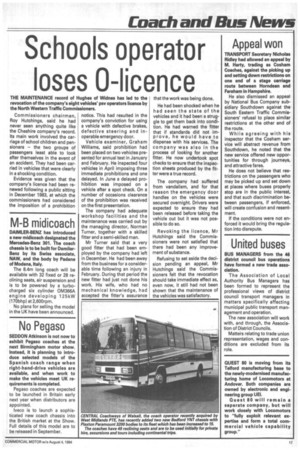Schools operator loses 0-licence
Page 19

If you've noticed an error in this article please click here to report it so we can fix it.
THE MAINTENANCE record of Hughes of Widnes has led to the revocation of the company's eight vehicles' psv operators licence by the North Western Traffic Commissioners.
Commissioners chairman, Roy Hutchings, said he had never seen anything quite like the Cheshire company's record. Its main work involved the carriage of school children and pensioners — the two groups of passengers least able to look after themselves in the event of an accident. They had been carried in vehicles that were clearly in a shocking condition.
Evidence was given that the company's licence had been renewed following a public sitting in December 1983, at which the commissioners had considered the imposition of a prohibition notice. This had resulted in the company's conviction for using a vehicle with defective brakes, defective steering and inoperable emergency door.
Vehicle examiner, Graham Williams, said prohibition had been placed on two vehicles presented for annual test in January and February. He inspected four vehicles in April imposing three immediate prohibitions and one delayed. In June a delayed prohibition was imposed on a vehicle after a spot check. On a number of occasions clearance of the prohibition was received on the first presentation.
The company had adequate workshop facilities and the maintenance was carried out by the managing director, Norman Turner, together with a skilled fitter and a semi-skilled man.
Mr Turner said that a very good fitter that had been employed by the company had left in December. He had been away from the business for a considerable time following an injury in February. During that period the new fitter had just not done his work. His wife, who had no mechanical knowledge, had accepted the fitter's assurance that the work was being done.
He had been shocked when he had seen the state of the vehicles and it had been a struggle to get them back into condition. He had warned the fitter that if standards did not improve, he would have to dispense with his services. The company was also in the process of looking for another fitter. He now undertook spot checks to ensure that the inspection sheets produced by the fitter were a true record.
The company had suffered from vandalism, and for that reason the emergency door handles on the vehicles were secured overnight. Drivers were expected to ensure they had been released before taking the vehicle out but it was not possible to do so.
Revoking the licence, Mr Hutchings said the Commissioners were not satisfied that there had been any improvement of substance.
Refusing to set aside the decision pending an appeal, Mr Hutchings said the Commissioners felt that the revocation should take immediate effect as, even now, it still had not been shown that the maintenance of the vehicles was satisfactory.
























































































